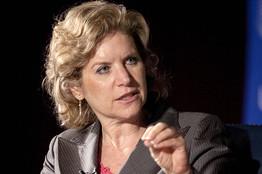Now that Susan Schwab, who was U.S. Trade Representative under President George W. Bush, has left public life, she's free to say what she really thinks about the state of trade relations with China.
 Bloomberg News
Bloomberg NewsFormer U.S. Trade Representative Susan Schwab
"Foreign firms are in fact discriminated against in this market," Ambassador Schwab, now a professor at the University of Maryland's School of Public Policy, declared at a panel discussion Saturday hosted by the Italian Embassy in Beijing.
Schwab referred to her own experience negotiating deals in China for Motorola in the early 1990s. At the time, "the message we got from the government was that there was technology transfer for market share," she said. Based on those signals, Motorola and other companies decided to invest for the long term in China, expecting treatment to improve over time.
"The outcome for major multinationals that took this approach has been very mixed," Ms. Schwab said.
She pointed to widely-publicized comments over the summer by Jeffrey Immelt, chief executive of General Electric, in which he worried whether China's government would in fact permit foreign companies to succeed in the country's domestic market.
Ms. Schwab also noted the experience of makers of high-speed rail equipment, who transferred technology to China but gained little market share from it. "They ended up creating a very serious competitor that s going to turn around and eat their lunch in their home markets," she said.
She did note that China's government recently launched a new drive to address one of foreign companies' main problems in China: the violation of intellectual-property rights in the form of things like pirated software and knockoff handbags. But she also pointed that similar government campaigns in past years have not resolved the problem.
"The government of China itself is one of the principal perpetrators of this theft of intellectual property," Ms. Schwab said. "State owned enterprises almost universally use pirated software."
As part of the latest crackdown, the Ministry of Finance has said it will provide government departments with extra funds to purchase legitimate software, although it remains unclear how authorities will be able to guarantee the money is spent as it's meant to be.
The disenchantment of big corporations with China could have consequences for how the political debate over trade evolves in the U.S., Ms. Schwab said.
"It's the same group of corporations that U.S. officials counted on to oppose protectionist legislation that are now having very severe doubts-not about competition but about the government of China and subsidies and forced technology transfer," she said.
"I think the jury is out on whether we will emerge from this rather complicated and rather disturbing situation."





